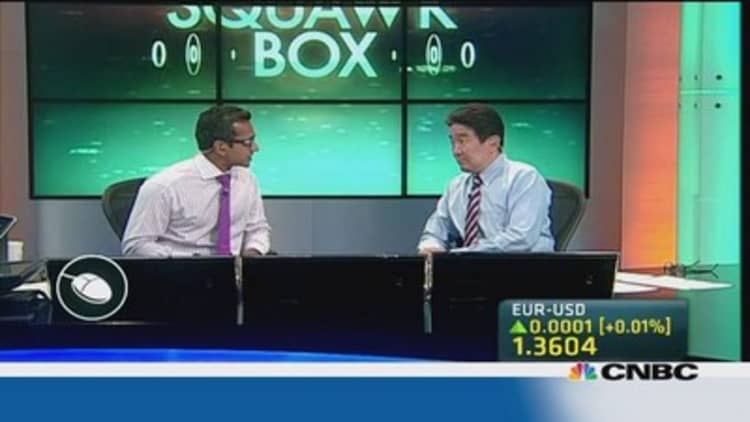Singapore's non-oil exports rebounded strong in December, smashing consensus expectations. Economists told CNBC this jump could help propel the economy's recovery this year.
Non-oil domestic exports (Nodx), which include sectors such as electronics and pharmaceuticals, were up 6 percent in December from a year earlier, a sharp rebound on the 8.9 percent contraction in the previous month, and well above consensus expectations for a 1.7 percent rise.
A strong increase in shipments of non-electronic products drove the rally, offsetting a 3 percent decline in electronic shipments, although this was an improvement on the previous months' 8.9 percent decline. The opening of a new petrochemicals plant by ExxonMobil in Singapore was also seen by analysts as a key driver of the uptick.
(Read more: Cost of living a major worry for young Singaporeans)
Economists told CNBC the strong pick-up in non-oil exports was a good sign for the economy amid better growth prospects in the rest of the global economy.
"We expect Singapore's gross domestic product to expand by 4 percent next year, mainly led by an improvement in exports and external demand," said Michael Wan, economist at Credit Suisse's Singapore office.
Singapore's economy has been in the doldrums in recent years, as a slowdown in the world's major economies took its toll on the nation's export-focused economy. The economy grew a meager 1.2 percent in 2012, but has picked up in 2013, expanding 4.4 percent on year in the final quarter of last year. The government expects the economy to grow between 2 and 4 percent this year.

Wan told CNBC the pick-up in exports signaled a strong year to come for Singapore.
"In 2014, trade will continue to improve, we see Europe climbing out of recession, while U.S. growth will be better and the global trade cycle will improve over the coming quarters," he said, adding that one headwind for the economy would be impact of government labor tightening measures.
(Read more: For Star Wars fans, the 'Sandcrawler' just got real)
Other economists told CNBC they had been surprised and encouraged by the strong rebound in non-oil exports for last month.
"We had expected a weaker number from the chemical cluster due to poor refining margins, but we saw a sharp rebound from November's plunge, partly due to the new petro-chemical plant and it was also linked to the modest recovery in global demand," said Song Seng Wun, regional economist at CIMB Research. Song told CNBC that most economists were in agreement that Singapore's export growth was moving in the right direction, but said the debate was over how much, adding that he expected the economy to grow between 3 and 5 percent this year.
"Singapore is export driven, therefore any sign of an improvement in key markets like the U.S., China and Europe is more hopeful. As the U.S. consumer becomes more confident about job prospects and income, appetite for imports, particularly electronics from automobiles to consumer electronics, could pick up," he said.
(Read more: Are Singapore home prices set for a bruising?)
Singapore's electronics exports have been weak in recent years, declining 11 percent in 2011, 4 percent in 2012 and 11 percent last year.
Credit Suisse's Wan said he did not expect the improvement in exports to continue at the same pace as seen in December, however.
"Next month's number probably won't be as strong, we will probably see a correction. The new petrochemical plant was the fundamental reason why we saw the strong spike," he said.
(Read more: Singapore home sales collapse as cooling measures bite)
Pharmaceutical exports contracted 18.7 percent in December, a vast improvement on a 46.9 percent decline in November. Electronic exports contracted 3.1 percent in December, an improvement on November's 8.9 percent decline.
When broken down into regions, Chinese demand for Singaporean exports saw the biggest improvement, jumping from 16 percent in November to 45 percent, meanwhile, demand from the U.S. rose to 27.9 percent from 10.3 percent.
—By CNBC's Katie Holliday: Follow her on Twitter @hollidaykatie


